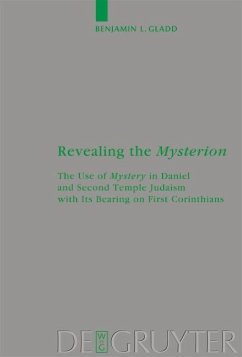Scholars largely agree that the NT term "mysterion" is a terminus technicus, originating from Daniel. This project traces the word in the Dead Sea Scrolls and other sectors of Judaism. Like Daniel, the term consistently retains eschatological connotations. The monograph then examines how mystery functions within 1 Corinthians and seeks to explain why the term is often employed. The apocalyptic term concerns the Messiah reigning in the midst of defeat, eschatological revelations and tongues, charismatic exegesis, and the transformation of believers into the image of the last Adam.
Dieser Download kann aus rechtlichen Gründen nur mit Rechnungsadresse in A, B, BG, CY, CZ, D, DK, EW, E, FIN, F, GR, HR, H, IRL, I, LT, L, LR, M, NL, PL, P, R, S, SLO, SK ausgeliefert werden.

